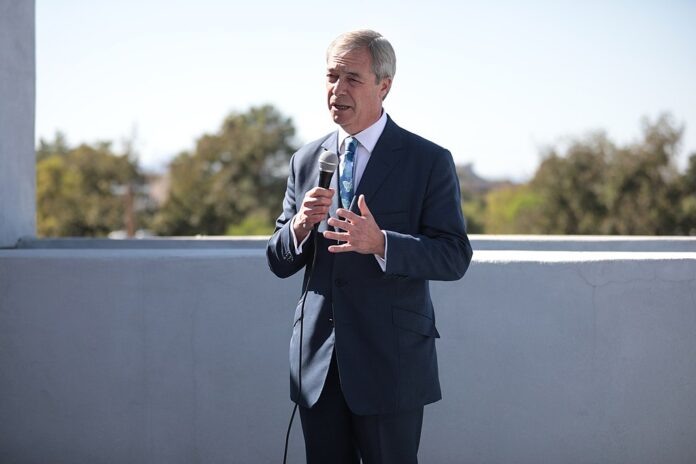Reform UK leader Nigel Farage’s income from GB News, social media, and various appearances has propelled him to the top of the earnings list among UK MPs
Nigel Farage has been revealed as the highest-earning MP in the UK, surpassing £1.2 million annually. The financial details, disclosed in the latest register of interests for the new parliament, highlight Farage’s substantial earnings from his role as a presenter on GB News and his various social media ventures.
According to the register, Farage earns £97,900 a month from his position at GB News, a channel co-owned by hedge fund billionaire Paul Marshall. His income from the channel alone places him at the top of the earnings list for MPs.
Embed from Getty ImagesIn addition to his media salary, Farage’s financial disclosures include several high-profile trips funded by various individuals. Farage’s visit to the US on July 17, following an assassination attempt on Donald Trump, cost £32,000 and was funded by Christopher Harborne, a crypto investor based in Thailand. Harborne, known for his previous financial support to the Brexit party, provided the funds to support Farage in his role as Clacton’s representative on the global stage.
Farage also reported a £9,250 trip to the National Conservatism Conference in Brussels in April, funded by George Cottrell, an unofficial aide with a controversial past. Cottrell, who was convicted of money laundering in 2017, had been involved in Farage’s entourage before the conviction.
Further financial details reveal Farage’s earnings from social media platforms, including £1,550 from X (formerly Twitter) and £853 from Meta (formerly Facebook). He also generated £4,000 from Cameo videos and receives an additional £4,000 per month from the Daily Telegraph.
These revelations have sparked criticism from figures like Jo Maugham, founder of the Good Law Project, who questioned the focus on Farage’s financial gains rather than public service. “You look at these numbers and you wonder, has Nigel Farage catapulted himself to the top of the list of highest earners in Clacton? Great for him, but it’s not really public service, is it?” Maugham remarked.
Farage’s financial status eclipses that of Geoffrey Cox, the previous highest-earning MP, who combines his parliamentary role with a lucrative career as a barrister. Cox earned £293,400 from his work with law firm Withers and received £379,000 from an Indian chambers for work carried out between 2016 and 2018.
The latest register of interests also highlights other notable disclosures, including Labour leader Keir Starmer receiving four tickets with hospitality to a Taylor Swift concert from the Football Association, valued at £4,000. Starmer had previously been scrutinized for accepting £76,000 in freebies and hospitality during his time in opposition.
In terms of donations, Labour Together, a think tank formerly managed by Starmer’s political strategist Morgan McSweeney, has contributed nearly £900,000 to the general election campaigns of 106 MPs. This funding, typically in the range of £5,000 to £10,000 per candidate, predominantly supported new MPs, with only seven of the 211 new Labour MPs having held their seats before the election.
Labour Together has also funded staff and research services for ten ministers, including Rachel Reeves, Yvette Cooper, and David Lammy, further illustrating the significant financial influence of political donations on parliamentary operations.
Analysis:
Political:
Nigel Farage’s emergence as the UK’s highest-earning MP highlights the intersection of politics and media influence. His substantial earnings from GB News reflect the growing trend of MPs and public figures leveraging media platforms for additional income. This development raises questions about the influence of media ownership on political figures and the potential for conflicts of interest. Farage’s financial success underscores the increasing importance of media presence in political careers, potentially influencing public perception and political effectiveness.
Social:
Farage’s financial disclosure reflects broader social concerns about the relationship between public service and private gain. The high earnings and funded trips suggest a blurring of lines between personal enrichment and political duties. This situation could contribute to public scepticism about the motivations of elected officials and the integrity of their roles. The prominence of social media earnings also reflects the changing landscape of public influence and the monetization of personal brands.
Racial:
While Farage’s earnings do not directly relate to racial issues, the broader context of financial transparency and political influence intersects with ongoing discussions about equality and representation. High earnings among certain MPs, coupled with funded trips and media roles, may contribute to perceptions of inequality and favoritism within the political sphere, impacting the broader discussion about equity in political representation and access.
Gender:
The financial disclosures and earnings of Farage, primarily male MPs, reflect existing gender imbalances in high-earning roles within politics and media. While Farage’s case highlights significant earnings, similar scrutiny could be applied to female MPs and public figures to ensure equitable financial transparency and opportunities. The discussion about earnings and funded trips also intersects with gender issues, as female MPs often face different challenges and barriers in similar roles.
Economic:
The financial success of Nigel Farage exemplifies the economic opportunities available to MPs through media engagements and personal branding. His substantial earnings from GB News and social media reflect the growing economic power of media platforms and their influence on political figures. The revelations about funding for trips and additional income sources highlight the economic implications of political roles and the potential for financial benefits beyond traditional salaries. This situation underscores the need for clear regulations and transparency regarding additional income sources for public officials.
